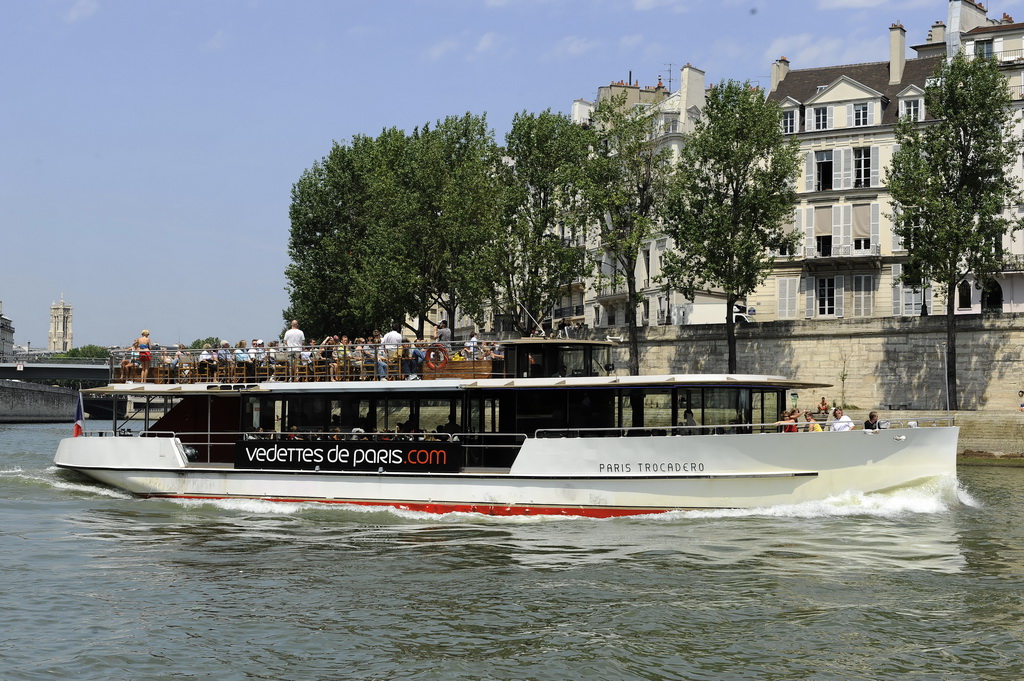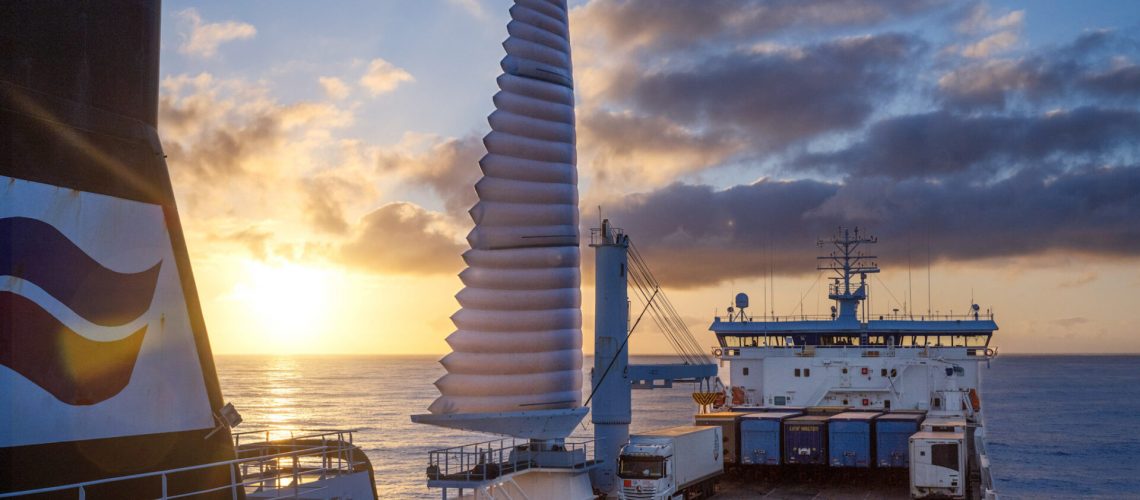The players in the maritime sector are committed to decarbonising the industry and providing innovative and technological solutions to accelerate the energy transition. Alternatives to fossil fuels, optimisation and control of energy, development of new uses, adapted financing and promotion of the sector… companies will be presenting their initiatives and solutions at Euromaritime from 30 January to 1 February 2024 in Marseille. Sea to sea, the show’s media partner, has selected a number of maritime innovations from the West.
ALTERNATIVES TO CARBON AND TECHNOLOGICAL BREAKTHROUGHS
Wind propulsion for merchant ships
In 2020, Wisamo, a MICHELIN Group initiative, is developing a wind propulsion solution to limit the environmental impact of maritime freight: the WISAMO wing. This automated, inflatable and retractable wing can be installed on any type of vessel around a telescopic mast. After an initial 100m2 prototype wing installed in 2021 on the sailboat of navigator Michel Dejoyeaux, Wisamo will install a second 100m2 prototype in June 2023 on the Compagnie Maritime Nantaise ro-ro vessel Le Pélican. These trials will enable the wing to be tested under real sea conditions. At the same time, Wisamo is developing a new 800m2 prototype wing on a 60-metre mast at its factory in Vannes. Tests should take place in the first quarter of 2025 between Vannes and Nantes.
H2 projects
IPC, the Port of Concarneau Interprofession, is carrying out a feasibility study to integrate an H2 fuel cell on board an existing fishing vessel. The aim is to find an alternative to diesel for 12-25m trawlers and take a step towards decarbonisation. The Anita Conti, a trawler from Le Guilvinec, was used as the basis for the study. Initial results from the PILOTHY project indicate that the fuel cell could reduce greenhouse gas emissions by 10-15%. This represents 75 tonnes of CO2 equivalent, saving 500 litres of diesel per three-and-a-half-day trip. The conversion of old ships is likely to be more advantageous than a new build, and has attracted a great deal of interest from shipowners, who are hoping for public support to finance the investment. Winner of the Brittany Region’s “Energy Transitions in the Breton Fishing and Aquaculture Sectors” call for projects, PILOTHY has been subsidised to the tune of €87,000 and is being carried out by a consortium of IPC member companies: Barillec Marine (pilot), Piriou ingénierie, Coprexma, Méca Diesel, Semim and Marinelec Technologies.
Barillec Marine, which has been involved in France’s main hydrogen-powered ship projects, is consolidating its expertise in innovative vessels, offering a comprehensive range of onboard energy management solutions. In addition to the PILOTHY project in Brittany, the company has already worked on several hybridisation projects, including the hydrogen-powered suction dredger. It has also been involved in a study into the integration of hydrogen on board a CTV, a vessel used to transport personnel to offshore wind farms.

Trocadero : Vedettes de Paris ©Vedettes de Paris
HYBRIDISATION AND OPTIMISING ENERGY CONSUMPTION
An analytical econometer to control fuel consumption and reduce environmental impact
Marinelec Technologies has developed ECOMER, a solution designed to optimise fuel consumption and reduce polluting gas emissions for all types of vessel. ECOMER collects, analyses and displays consumption data in real time, item by item, and can act directly on the source of energy consumption, thanks to an automatic control function. This connected system, which helps to drive a ship economically, also optimises the ship’s preventive and corrective maintenance. A reliable electronic tool that has already proved its worth to shipowners in the towing, passenger transport and fishing sectors.
Hybrid ships and greener diesel engines
Hybridisation is an immediate technological solution for reducing the carbon footprint of maritime transport. Diesel-electric propulsion is being developed on all types of ships, offering shipowners an ecological and economical alternative. Here are a few examples of local players committed to this approach:
– Electrician BARILLEC Marine has just fitted the first units of the Vedettes de Paris river cruise boats with 100% electric engines. The company has also fitted the “Finistère” buoy tender belonging to Armement des Phares et Balises with a zero-emission hybrid drive.
– The naval architecture and design office COPREXMA designed the “Finistère” buoy tender. It also designed the first electrically propelled aluminium barge for oyster farms in the Bay of Morlaix. The Breton company is providing project management assistance for the new hybrid training ship at the Lycée maritime in Paimpol.
– ENAG is to convert two units of the bateau-mouche company to a hybrid propulsion system in the run-up to the 2024 Olympic Games to be held in Paris. The Paimpol-based company, which specialises in the design, development and manufacture of small-series electrical equipment, is calling on Marinelec Technologies for its hybridisation supervision systems and to overhaul the boats’ safety equipment.
– The HYBA (Hybride Bretagne Atlantique) project, led by the Comité régional des pêches de Bretagne and supported by a consortium of nine Breton partners, including several companies exhibiting at Euromaritime, aims to develop a customised hybridisation and energy optimisation solution for new and existing trawlers. The first phase of the technical and economic study will begin in January 2024 on a vessel based in Lorient. This test phase will involve collecting and analysing data in real-life conditions.
– Based in Quimperlé, Le Pocher Moteurs et Solutions, the exclusive Volvo Penta distributor, offers a state-of-the-art solution with the latest generation of Volvo Penta diesel engines, which comply with the IMO Tier III standard. This range of engines guarantees a reduction of around 70% in nitrogen oxide (NOx) emissions, while providing efficient exhaust gas treatment thanks to SCR (Selective Catalytic Reduction) technology.
SERVICES TO ACCELERATE THE ENERGY TRANSITION
The blue bank for the maritime industry
Banque Populaire Grand Ouest and its Crédit Maritime brand offer a wide range of financial solutions for manufacturers and shipowners. It is now positioning itself as an arranger of maritime leasing with tax leverage and aims to democratise this scheme to facilitate the acquisition of small tonnage vessels, with investments ranging from 3 to 30 million euros. In this way, Banque Populaire Grand Ouest is offering shipowners a comprehensive financing solution and intends to help accelerate the decarbonisation of the sector. Recognised as a major player in the financial support of traditional and emerging maritime activities, the blue bank is also committed to promoting the sector’s virtuous initiatives through its Trophées Innovation Océan.
Positive communication to promote sustainable shipping
For nearly 16 years, the Sea to sea communications agency has been passionately helping professionals in the maritime sector with their communications. Sea to sea stands out for its in-depth knowledge of the naval, maritime, port and river ecosystems. The agency, based in Concarneau, offers positive communication aimed at highlighting seafarers and their expertise. Sea to sea has created the Wisamo logo and developed a range of media to promote marine propulsion; it communicates on decarbonised innovations and projects via social networks and the press on behalf of Marinelec Technologies, Coprexma, Ets Le Pocher, Naos Ingénierie and the Port of Concarneau Interprofession; it has designed the content for visits to the Navire des Métiers l’Expo organised by CINav; carries out employer branding campaigns to attract new talent on behalf of Barillec Marine; designs websites such as Protection Incendie Cornouaille’s, which also aims to raise awareness of fire safety; runs press campaigns to promote Banque Populaire Grand Ouest’s innovative initiatives in support of the blue economy…
Attractiveness of the profession and training courses
The CINav association works to serve the maritime industry in terms of training, jobs and skills. Since 2017, CINav has been working to promote and make the industry and its professions more attractive; for the maritime coloration it organises seminars and training courses and deploys the By CINav or CINav Partner labels to training organisations. Recognised by companies in the industry, these labels offer greater visibility and help to make training courses more attractive to future generations.
All the innovations and solutions for decarbonising maritime transport can be discovered at the Euromaritime trade show, from 30 January to 1 February in Marseille.

